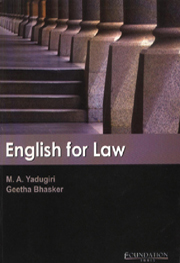Book contents
- Frontmatter
- Preface
- Contents
- A Note to the Student
- Notes to the Teacher
- 1 Nature of Law
- 2 Crimes and Civil Wrongs
- 3 Command of Language in the Profession of the Law
- 4 Plain Language and the Law
- 5 The Indian Constitution
- 6 The Impact of Technology on the Practice of Law
- 7 The International Court of Justice
- 8 Application of Precedents
- 9 Statutory Interpretation
- 10 Legal Reasoning
- 11 Plaints and Writs
- 12 Judgment
- 13 Of Defamation
- 14 Consumer Protection (Amendment) Act, 1993
- 15 The Information Technology Act, 2000
- 16 Universal Declaration of Human Rights
- Answer Key
9 - Statutory Interpretation
Published online by Cambridge University Press: 26 October 2011
- Frontmatter
- Preface
- Contents
- A Note to the Student
- Notes to the Teacher
- 1 Nature of Law
- 2 Crimes and Civil Wrongs
- 3 Command of Language in the Profession of the Law
- 4 Plain Language and the Law
- 5 The Indian Constitution
- 6 The Impact of Technology on the Practice of Law
- 7 The International Court of Justice
- 8 Application of Precedents
- 9 Statutory Interpretation
- 10 Legal Reasoning
- 11 Plaints and Writs
- 12 Judgment
- 13 Of Defamation
- 14 Consumer Protection (Amendment) Act, 1993
- 15 The Information Technology Act, 2000
- 16 Universal Declaration of Human Rights
- Answer Key
Summary
The law applicable to the facts of a dispute may be contained in an Act of Parliament, and knowing the law then involves interpreting a legislative text. Unlike case law, where judges construct their own texts out of precedents (rationes decidendi), with statute law the texts are presented to them.
Legislation may be described as law made deliberately in a set form by an authority, which the courts have accepted as competent to exercise that function. From sparse and scanty beginnings, its use steadily increased until now the output of statutes has assumed formidable proportions. Although the volume and the nature of certain kinds of legislation may be subjected to criticism, there is universal agreement that deliberate law making of this kind is indispensable to the regulation of the modern state. The part played by the judges in the struggle between the prerogative and Parliament enabled them to preserve in their hands a considerable measure of power, one aspect of which is that what becomes ‘law’ is their interpretation of statute through the operation of stare decisis. As Lord Devlin has put it:
‘The law is what the judges say it is. If the House of Lords were to give an Act of Parliament a meaning which no one else thought it could reasonably bear, it is their construction of the words used in preference to the words themselves that would become the law.’
[Samples of Law Making, p. 2]- Type
- Chapter
- Information
- English for Law , pp. 283 - 337Publisher: Foundation BooksPrint publication year: 2005



